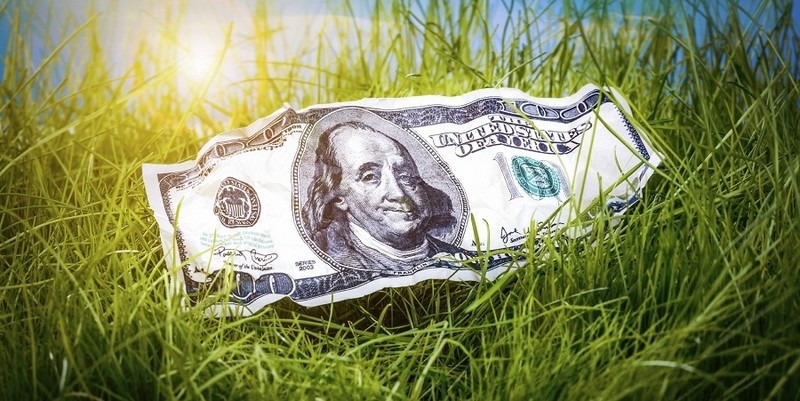It was a bit easier being green in 2015, thanks to
the plunge in energy stocks – but not as easy as you might think.
Social investment funds typically try to avoid stocks of companies that contribute to the world's ills, such as weapons makers, alcohol and tobacco manufacturers and polluters. Not surprisingly, many social investment funds have a tough time investing in oil companies because of their environmental records. Many have no energy stocks at all.
In years when oil prices soar, social investment funds often struggle. But anyone who dodged the energy sector in 2015 should be happier than a wildcatter with a gusher. The price of oil peaked in June 2014 at $107.95, according to the
U.S. Energy Information Administration. By the end of 2015, a barrel of West Texas Intermediate Crude — the type produced in the U.S. — plummeted 66% to $36.36.
Thanks to oil's steep decline, many energy stocks pumped mud last year. Shares of ExxonMobil (XON) fell 12.57%, including reinvested dividends; Apache (APA) plunged 27.45%. The energy sector has tumbled 21.13%, since June 2014, according to Standard & Poor's.
Had you simply dodged the energy sector in 2015 and invested in all other stocks in the S&P 500, you would have ended the year with a 3.44% gain — again, including dividends — rather than the 1.38% gain for the index as a whole. It's not a home run, but hey, it beat the S&P 500.
Not surprisingly, funds that avoided energy entirely had a leg up on those that didn't. Brown Advisory Sustainable Growth (BAFWX), for example, had no energy stocks, according to its most recent holdings report. The fund jumped 13.02% last year, clobbering not only its benchmark, the Russell 1000 Growth Index, but 99% of its peers in Morningstar's large-growth category.
Having rockets like Amazon(AMZN, +117.78%), Visa (V, +19.07%) and Facebook (FB, +34.15%) in the fund's top three holdings certainly didn't hurt. But having no oil stocks was also a boost. “We don't screen out entire sectors of the economy,” said Karina Funk, co-manager of the fund. “But there are many reasons oil companies don't fit the bill. In the short term, they're subject to commodity price risk and volatility. In the long term, it's a very cyclical and volatile sector with the risk of changing with consumer preferences and government regulation. And it's just not growthy enough.”
Similarly, Parnassus Endeavor (PARWX) is stuffed with red-hot names such as Altera, which Intel (INTL) bought last year for $16.7 billion, a 56% premium over the company's stock price before news of the acquisition broke. But its zero stake in energy helped the fund dodge a bullet. “The absence of oil is definitely a big plus,” said Jerome Dodson, the fund's manager.
The fund also dodged alternative energy, many of which, like SolarCity (SCTY) and SunEdison (SUNE), produced mediocre-to-dismal returns. The problem with alternative-energy stocks generally is that they often don't have earnings. “I like stocks that have earnings,” Mr. Dodson said. And unfortunately, he added, many alternative energy stocks that do have earnings are far too expensive.
But the collapse in energy prices wasn't a get-out-of-mediocrity-free ticket for all social investment funds. Even though underweight in energy, a fund can still make bad moves elsewhere. For example, Vanguard FTSE Social Index Fund Investor Shares (VFTSX) eked out a 1.17% gain in 2015, even though it had just 2.26% of its assets in energy. Its top position, Apple (AAPL), fell 2.8% last year.
“The financials were down for the year, so that pulled them down,” said Dan Wiener, publisher of
The Independent Adviser for Vanguard Funds, a newsletter. The sector fell 3.45% last year. “Just matching the market was about as good as it could get for the social index,” Mr. Wiener said.
Bear in mind that “social investment” depends a great deal on what issues you feel are important. Morningstar lists American Funds Washington Mutual (AWSHX) as a social investment fund because it won't invest in tobacco companies. A spokesman for the American Funds said they don't consider Washington Mutual a social investment fund. Similarly, the Ariel Fund won't invest in liquor or tobacco companies, but the Chicago-based fund company doesn't market its funds as socially responsible, either.
Most investors don't buy social investment funds with the aim of beating the S&P 500;
they want funds that suit their conscience. But for those investors, it's nice to be helped by the stocks they avoid, as well as the stocks they don't.







